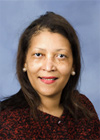
On November 20, Valerie Whittlesey, PhD, associate vice president for curriculum and professor of psychology at Kennesaw State University (KSU), will join a panel of expert presenters for a Faculty Conversation focused on "Curricular Designs for Global Learning.”
To help start the conversation, NAFSA asked Whittlesey a few questions about what the panel and participants will discuss as they explore the different ways institutions are working to ensure that all of their graduates become active, successful members of the global community.
The curricular change process can be daunting. What are some first steps for greater integration of global learning?
A good first step is to give faculty the tools and resources they need to infuse global learning into their courses. Professional development opportunities (such as faculty learning communities, attending conferences, etc.) where faculty can share and learn from each other and hear best practices creates a community of practice that is critical for curricular shifts.
It is also important for an institution to make quality teaching and global learning important. It is not enough to say it, but the institutional leaders have to demonstrate their commitment by rewarding teachers for their integration of global learning in the form of faculty awards; promotion and tenure; and in reassigned time.
Why is it important for institutions to include global learning in their general education curriculum?
We live in a diverse society and world, and employers indicate they want college graduates to have the skills to work with others who are different and to appreciate different perspectives. That means we need to prepare our students to become effective global citizens. The general education, the major, and the co-curriculum should work in harmony to provide students with the knowledge and skills to work and live in a pluralistic society.
What's your favorite example of successfully “globalized” curriculum?
In my role at KSU, I am chair of the General Education Council, which is the faculty governance committee that oversees the general education program. Previously, we had a global perspectives and a critical thinking learning outcome, and the critical thinking learning outcome assessed global learning courses. We are in the midst of a consolidation with another University System of Georgia institution effective fall 2015. As part of the consolidation, we revised our general education program and learning outcomes for the new KSU.
The general education faculty at both institutions have a commitment to global learning in the general education curriculum. I am excited because we now have the following learning outcomes for the general education program: global perspectives, intercultural competence, and critical thinking, and these three outcomes are addressed in more than one area of the core. This was possible because the combined faculty created a robust “globalized” general education curriculum.
It is gratifying when faculty agree that global learning is important and work to make it happen in the curriculum.
